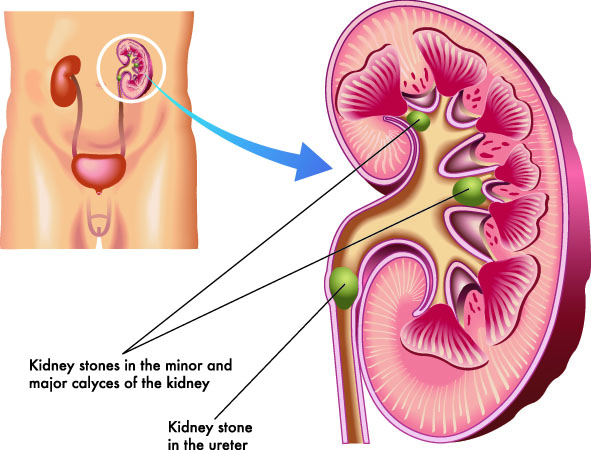Kidney Stones vs UTI: Essential Information on Treatment Options and Prevention
Kidney Stones vs UTI: Essential Information on Treatment Options and Prevention
Blog Article
Exploring the Effects and Causes of Kidney Stones in Comparison to Urinary System Tract Infections: A Detailed Guide
The expedition of kidney rocks and urinary system tract infections (UTIs) reveals an intricate interaction of signs and symptoms and underlying causes that warrant careful exam. While both conditions can cause hematuria, they present distinctive professional features and occur from various etiological elements. Recognizing the subtleties of each condition is essential for reliable diagnosis and administration. What are the vital differences in their symptoms, and how might these educate therapy approaches? The response to these inquiries may supply crucial understandings right into the prevention and treatment of these usual urological issues.
Review of Kidney Stones
Kidney stones, also called kidney calculi, form when particular materials in the urine crystallize and accumulation, leading to the advancement of difficult down payments within the kidneys. These rocks can vary in dimension, varying from a grain of sand to a golf sphere, and can be composed of different products, the most typical being calcium oxalate, uric acid, struvite, and cystine. The formation of kidney rocks is influenced by several variables, consisting of dietary behaviors, fluid intake, and hereditary proneness.
Signs and symptoms of kidney stones might include severe pain in the back or side, blood in the pee, nausea or vomiting, and frequent urination, specifically as the stone relocates with the urinary system system. Medical diagnosis commonly entails imaging researches such as ultrasound or CT scans, along with urinalysis to identify the stone's make-up.
Therapy options differ based on the size and sort of stone, in addition to the extent of signs and symptoms (Kidney Stones vs UTI). Little stones may pass naturally with raised liquid intake, while bigger stones may require clinical interventions such as lithotripsy or medical elimination. Recognizing the pathophysiology and threat aspects related to kidney stones is important for reliable avoidance and administration
Summary of Urinary System Infections
Urinary system system infections (UTIs) are common bacterial infections that affect any component of the urinary system, consisting of the kidneys, ureters, bladder, and urethra. They mainly happen when bacteria, usually from the intestinal tract, go into the urinary system, leading to swelling and infection. UTIs are classified into two primary kinds: straightforward and complicated. Uncomplicated UTIs normally happen in healthy and balanced people with normal urinary system systems, while complex UTIs may arise in people with hidden conditions, such as structural abnormalities or jeopardized body immune systems.
The frequency of UTIs is notably greater in ladies than men, mostly because of anatomical distinctions, such as a shorter urethra. Threat factors consist of sexual task, specific contraceptive techniques, urinary retention, and dehydration. The diagnosis of UTIs is normally verified via pee tests, which may disclose the existence of germs, white blood cells, or red blood cells.

Signs of Kidney Stones
The pain connected with kidney stones can manifest in numerous ways, usually leading individuals to look for clinical focus. One of one of the most typical signs and symptoms is extreme discomfort, commonly local in the reduced over here back or side, which might emit to the abdomen or groin. This discomfort, usually called sharp or cramping, can occur suddenly and may fluctuate in intensity.
In addition, people might experience hematuria, or blood in the pee, which can vary from tiny amounts to visible staining. This sign might be gone along with by changes in urinary practices, such as raised frequency or urgency, in addition to pain during urination. Queasiness and throwing up are likewise common, typically resulting from the body's response to extreme pain.
In some situations, individuals might experience read the full info here fever and cools, particularly if a second infection develops due to the obstruction brought on by the stones. Generally, the mix of severe pain, hematuria, altered urinary system patterns, and intestinal signs can offer significant understanding into the existence of kidney rocks, necessitating prompt medical assessment and intervention. Recognizing these symptoms is critical for timely medical diagnosis and reliable administration of the condition.
Symptoms of Urinary System Infections
Infections within the urinary system tract typically offer a series of unique signs that can substantially affect day-to-day live. The most usual symptoms consist of a consistent urge to urinate, frequently accompanied by a burning sensation throughout urination, referred to as dysuria. Individuals may additionally experience boosted regularity of urination, producing little amounts of urine each time.
Various other notable signs include reeky or cloudy pee, which might show the visibility of microorganisms or pus. Sometimes, pee might appear pink or red as a result of the presence of blood, a condition referred to as hematuria. Additionally, individuals may experience pelvic pain or pressure, which can better exacerbate the feeling of necessity.
Systemic symptoms may additionally manifest, such as fever, chills, and fatigue, especially if the infection has risen to the kidneys. It is necessary to identify these symptoms early, as unattended urinary tract infections can bring about much more severe difficulties. Kidney Stones vs UTI. Trigger clinical focus is suggested when these signs and symptoms are observed, permitting suitable diagnostic examination and treatment to reduce pain and prevent further wellness problems
Reasons For Each Condition
Often, kidney stones and urinary system infections develop from unique yet occasionally overlapping reasons that can impact people in different ways. Kidney stones usually develop because of metabolic variables, nutritional choices, and hereditary proneness. Boosted degrees of calcium, oxalate, or uric acid in the pee can lead to rock development. Dehydration, insufficient liquid intake, and high-sodium diet regimens can intensify these problems, promoting formation within the urinary tract.

Understanding these distinctive reasons directory is vital for prevention and therapy. Kidney Stones vs UTI. While way of life alterations may minimize the danger of kidney stones, appropriate hygiene and prompt treatment of urinary system tract infections are important for reducing their reappearance and connected problems
Conclusion
In recap, kidney stones and urinary system infections present distinctive symptoms and underlying causes. Kidney rocks are defined by severe pain and metabolic factors, while urinary system system infections mostly involve bacterial infections bring about urinary system urgency and pain. Both problems can result in hematuria, their formation devices vary substantially. Comprehending these differences is vital for efficient diagnosis and therapy, eventually boosting individual end results for those impacted by either condition.
The expedition of kidney stones and urinary system system infections (UTIs) reveals a complex interplay of signs and underlying causes that warrant careful exam.Urinary system infections (UTIs) are common bacterial infections that influence any part of the urinary system, including the kidneys, ureters, bladder, and urethra.Frequently, kidney rocks and urinary tract infections develop from distinctive yet sometimes overlapping reasons that can influence individuals differently.In summary, kidney stones and urinary system system infections existing unique signs and symptoms and underlying causes. Kidney stones are defined by extreme discomfort and metabolic aspects, while urinary tract infections primarily include microbial infections leading to urinary necessity and discomfort.
Report this page